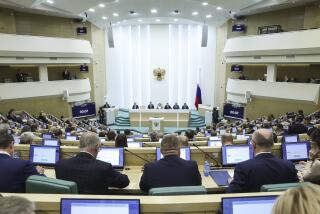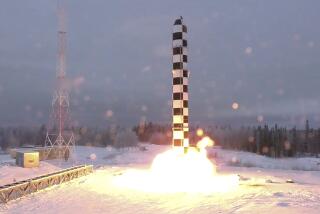Russia Hails U.S. Delay of Tests
- Share via
MOSCOW — The U.S. decision to delay missile defense testing was hailed in Russia on Thursday night as a sign that the Bush administration is starting to get it: America may be the world’s richest country, but it cannot run roughshod over everyone else.
After nearly a year of insisting that Washington wouldn’t be slowed down by Russian objections to a national missile defense, Defense Secretary Donald H. Rumsfeld said Thursday that there was no need to offend Moscow just yet by going ahead with three planned tests that might violate the 1972 Antiballistic Missile Treaty.
Coming after recent talks between President Bush and Russian President Vladimir V. Putin in Shanghai, the announcement prompted Russian analysts to say they see hints of a more conciliatory tone from a U.S. administration made more aware by the war against terrorism of the need to operate by international consensus.
Although there was little sense here that the Bush administration would retreat from its plans for a missile defense system, the initial view here was that the United States would be more inclined to delay its implementation, out of sensitivity to Russia and because of the realization that other threats to U.S. security are more imminent.
“America was under the illusion that it was so strong, so advanced and so rich, that the only thing left to be done to make it absolutely invulnerable was to build the [national missile defense] shield which would protect the U.S. from the rest of the world,” said Alexander A. Konovalov, president of the independent Institute for Strategic Assessment in Moscow.
“America viewed itself as a shining city at the top of the hill, a city that did not want to be lectured by the rest of the world,” he said.
But the events of Sept. 11 have changed that, he said. The U.S. has no need to rush ahead with a $60-billion program “in a situation when there are more pressing needs and more lethal dangers,” he said.
“The statement made by Washington today goes to show that the U.S. side has awoken to the reality and has started to realize where its main priorities lie.”
Anatoly I. Utkin, a foreign policy expert at the USA-Canada Institute in Moscow, said he would have felt better if the announcement of the delay in tests had come from Bush instead of Rumsfeld.
Utkin said the move could be construed as an overdue gesture of gratitude from Washington for the help that Russia has been giving the U.S. in the anti-terrorism war.
“The words said by Rumsfeld today should have been said by President Bush, who should have pointed out that he appreciated the stance of the Russian president, who was one of the first to react to America’s needs in the operation in Afghanistan,” Utkin said.
Bush and Putin discussed the missile defense issue at last weekend’s economic summit of Pacific Rim nations in Shanghai, but after that meeting there was little indication that either side had budged from its initial position.
In the past, the U.S. has suggested that if Moscow agreed to abandon the ABM treaty, Washington would agree to a mutual series of deep cuts in offensive nuclear weapons, a move sought by Russia because it has difficulties maintaining its large arsenal. The issue is expected to be taken up again in mid-November, when Putin is scheduled to travel to Bush’s Crawford, Texas, ranch.
Konovalov said he saw a parallel between Rumsfeld’s statement that testing will be delayed and Russia’s recent agreement to give up its Lourdes naval base in Cuba.
“It would be incorrect to talk about Russia’s victory, just as it is incorrect to call the closure of the Lourdes base a U.S. victory,” he said.
“It is no one’s victory--it is simply done in order to further the national interests of both countries, and both Russia and the United States will benefit.”
*
Alexei V. Kuznetsov of The Times’ Moscow Bureau contributed to this report.
More to Read
Sign up for Essential California
The most important California stories and recommendations in your inbox every morning.
You may occasionally receive promotional content from the Los Angeles Times.













